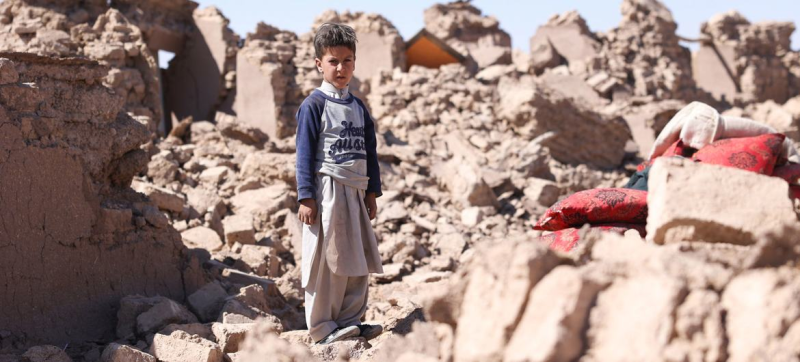- World Cup ticket prices to start at $60, may rise to $6,730 |
- Gazipur kitchen market fire under control after one hour |
- 10 MNC to enter bourse; Dhaka Stock Brookers laud BSEC |
- Dhaka bourse sees highest turnover in 12 months |
- Xi unveils vision for equitable global governance, rejects unilateralism |
Afghanistan Quake Kills Hundreds, Relief Efforts Underway

Destruction from the deadly earthquake that hit Herat province in October 2023.
A magnitude 6 earthquake struck remote areas of eastern Afghanistan overnight, reportedly killing at least 800 people and destroying villages. UN Secretary-General António Guterres pledged on Monday to “spare no effort” in assisting those affected.
“I stand in full solidarity with the people of Afghanistan after the devastating earthquake,” Guterres said in an online message. “I extend my deepest condolences to the families of the victims and wish a speedy recovery to the injured. The UN team in Afghanistan is mobilized and will spare no effort to assist those in need.”
UN agencies reported devastation across four eastern provinces, including Nangarhar and Kunar, where staff and humanitarian partners are already supporting relief efforts.
Witnesses said the earthquake struck around midnight local time, raising fears that many Afghans may still be trapped under rubble. The epicentre, estimated at just eight kilometres underground, caused tremors in Kabul and Pakistan’s capital, Islamabad.
Agencies providing assistance include UNAMA, OCHA, WHO, and UNHCR. WHO teams are on the ground in hospitals and health facilities, delivering essential medicines, medical supplies, and deploying health teams to affected areas.
The UN has been present in Afghanistan since 1949. Its country team, led by Resident Coordinator Indrika Ratwatte, includes around 20 UN agencies and partners such as the World Bank and Asian Development Bank.
UNHCR reported more than 2,000 likely injured in Kunar province alone and warned that Jalalabad may have a “very high death toll.” Relief efforts include medical aid, clean water, tents, blankets, and other essential supplies.
OCHA noted that aid teams face challenging terrain to reach remote communities. Heavy machinery has been deployed to remove road blockages in Nurgal and Chawkay districts, and critically injured people have been airlifted to hospitals in Jalalabad and Asadabad. Some isolated areas, including Dewagal Valley and Mazar Valley, remain accessible only by foot, requiring up to three hours of travel from the nearest cleared road.
This earthquake is among the worst to strike Afghanistan and comes less than two years after a deadly 6.3 magnitude tremor hit Herat, affecting tens of thousands.

